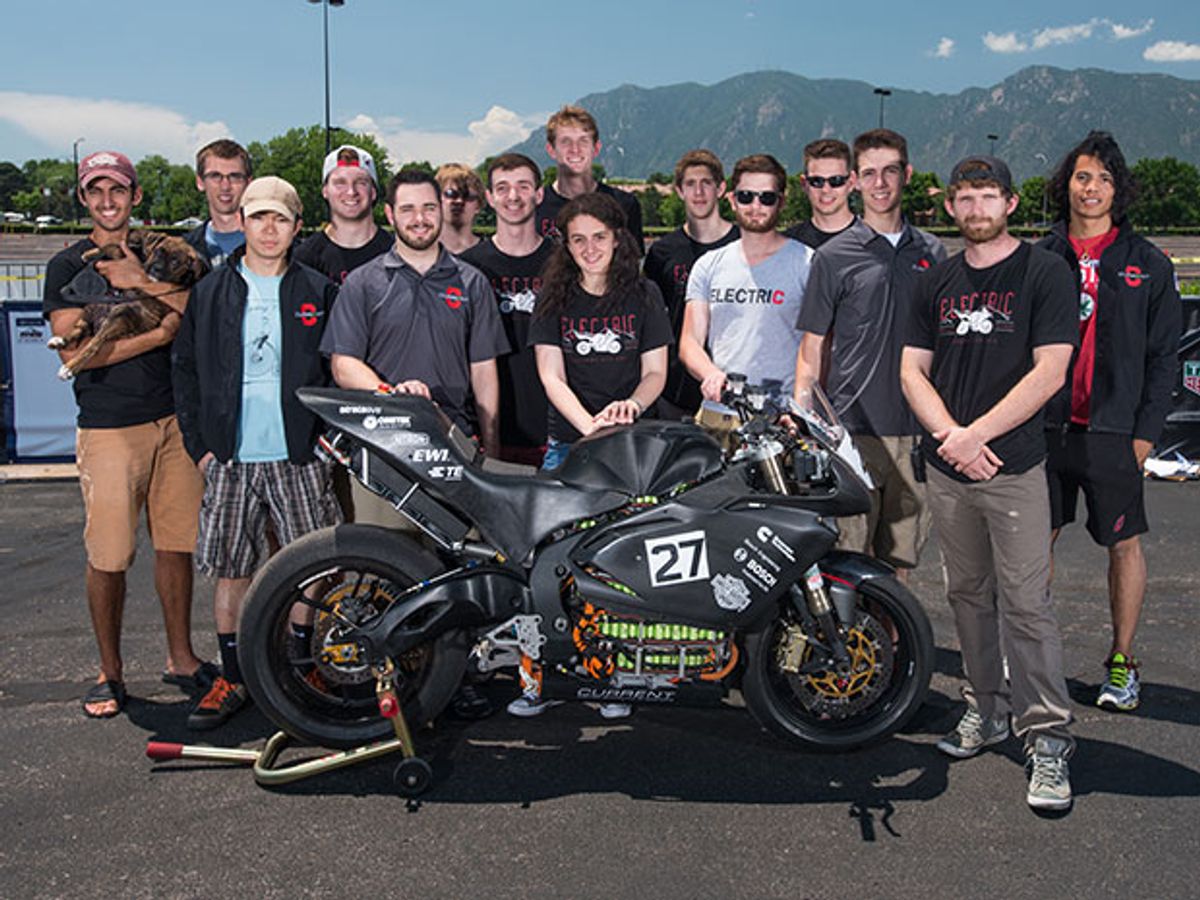Pikes Peak, Colo., 22 June—The second day of time trials for Sunday’s motorized climb up Pikes Peak drops the motorcycle entries down a peg from yesterday: They climb the middle of the mountain instead of to the summit.
But every day is a bug-killing day. The student engineers from Ohio are systematically teasing out glitches in their all-electric motorcycle, the Buckeye Current. Yesterday’s headache was the burnout of the circuit feeding the bike’s noise maker, which is meant to shoo off any pedestrians who might not know that the race is still going on. The solution: an $8 car-alarm-like device purchased from a local purveyor, who specializes in just such emergencies.
Today’s problem is in the motor’s cooling loop, which includes a pump, a water supply and a radiator. (There’s another loop just for the inverter, which has a different optimal temperature.)
During the run up to the base from which he started yesterday—called the Devil’s Playground, because it’s a natural lightning rod—the motor gets a little hot. British pro rider Rob “The Bullet” Barber posts a good, fast run. But the heat problem might well doom his chances on race day, when he must ascend from the base to the summit, covering 20 kilometers (12.4 miles) and rising 1.4 km (0.9 mile).
When the motor begins overheating it tells the power-management software to reduce power from the battery pack. So, though the motorcycle keeps on going, it lose a lot of oomph. Goodbye, victory.
The team’s first guess is that the water was low because the system had sprung a leak. A quick fix might have involved encasing the thing in water-sealing goop. But before the grease guns can come out it begins to appear that the weak water flow had another cause: bubbles.
“I don’t think there was a leak,” says Brody Ringler, a third-year student mechanical engineering. “Air bubbles probably worked their way up, blocking full circulation, so there was still some heat transfer, but not enough. The motor was just starting to get hot enough to cause the system to pull back [on power].”
He figures his tweaks have fixed the problem. But the team will look into it again this afternoon, in the garage of a rented home in Colorado Springs that serves as their main laboratory here.
I ask team leader Aaron Bonnell-Kangas, a graduate student in electrical engineering, why no sensors had been installed in the cooling loop. “We did put in sensors, but they’re not working,” he says. “It was down on our list of bugs, and other things were more important. And putting sensors everywhere can increase the burden, adding more things that can go wrong.
Would another week of trial and error have been enough to clean out most of the bugs? “A week like this, followed by a month back in the lab, is what would make a difference,” he says.
Then up come members of the main rival, backers of an electric bike called the Kommit EVT Zero FXS. The long name is testimony to the broad collaboration in the team, which involves MIT; Mirai, a Japanese racing firm; and Komatti, a U.K. team based in the Isle of Man (site of a famous motorcourse). They ask for electricity, and the Buckeyes graciously allow them to plug into their Cummins generator, a trailer-drawn behemoth that probably could supply the entire contingent of racers here.
The MIT team is having trouble with their charger, a key and expensive component, according to Bonnell-Kangas. A meter or two from where I’m standing they are working on exposed circuitry carrying high voltages. “The have an open box—not something I’d want to have,” he says.
He must be relieved that today, at least, the other team’s bugs are worse than his. Though the Ohioans say their first priority is to win the race not to set a record. And to do that you don’t have to outrun the clock—you only have to outrun your rivals.
Philip E. Ross is a senior editor at IEEE Spectrum. His interests include transportation, energy storage, AI, and the economic aspects of technology. He has a master's degree in international affairs from Columbia University and another, in journalism, from the University of Michigan.



